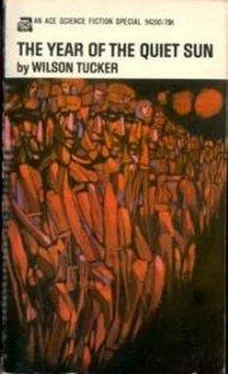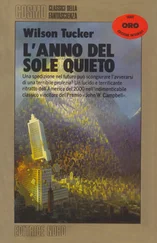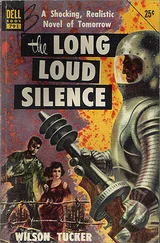Wilson Tucker - The Year of the Quiet Sun
Здесь есть возможность читать онлайн «Wilson Tucker - The Year of the Quiet Sun» весь текст электронной книги совершенно бесплатно (целиком полную версию без сокращений). В некоторых случаях можно слушать аудио, скачать через торрент в формате fb2 и присутствует краткое содержание. Год выпуска: 1970, ISBN: 1970, Издательство: Ace Books, Жанр: Фантастика и фэнтези, на английском языке. Описание произведения, (предисловие) а так же отзывы посетителей доступны на портале библиотеки ЛибКат.
- Название:The Year of the Quiet Sun
- Автор:
- Издательство:Ace Books
- Жанр:
- Год:1970
- ISBN:0-441-94201-6
- Рейтинг книги:3 / 5. Голосов: 1
-
Избранное:Добавить в избранное
- Отзывы:
-
Ваша оценка:
- 60
- 1
- 2
- 3
- 4
- 5
The Year of the Quiet Sun: краткое содержание, описание и аннотация
Предлагаем к чтению аннотацию, описание, краткое содержание или предисловие (зависит от того, что написал сам автор книги «The Year of the Quiet Sun»). Если вы не нашли необходимую информацию о книге — напишите в комментариях, мы постараемся отыскать её.
Won retrospective John W. Campbell Memorial Award in 1976.
Nominated for Nebula Award for Best Novel in 1970.
Nominated for Hugo Award for Best Novel in 1971.
The Year of the Quiet Sun — читать онлайн бесплатно полную книгу (весь текст) целиком
Ниже представлен текст книги, разбитый по страницам. Система сохранения места последней прочитанной страницы, позволяет с удобством читать онлайн бесплатно книгу «The Year of the Quiet Sun», без необходимости каждый раз заново искать на чём Вы остановились. Поставьте закладку, и сможете в любой момент перейти на страницу, на которой закончили чтение.
Интервал:
Закладка:
“Arrival was at 7:55. I don’t know why.”
“Old William was upset, mister. We were supposed to be first but you fouled up the line of seniority.”
Chaney said impatiently: “I can’t explain it; it just happened. That gyroscope isn’t as good as the engineers claimed it to be. Maybe the mercury protons need fixing, recharging or something. Did you hit the target?”
“Dead on. William was three or four minutes off. Seabrooke won’t like it, I’ll bet.”
“I wasn’t jumping with joy; I expected to find you and the Major waiting for me. And I wonder now what will happen on a long launch? Can those protons even find 2000?”
“If they can’t, mister, you and me and old William will be wandering around in a fog without a compass; we’ll just have to kick backwards and report a scrub.”
The camera was moved again and another page copied.
“Hey — did you see the girls?”
“Two librarians. They were sitting down.”
“Mister, you missed something good. They wear their hair in a funny way — I can’t describe it — and their skirts aren’t long enough to cover their sterns. Really, now, in November! Most of them wore long stockings to keep their legs warm while their sterns were freezing, and most of the time the stockings matched their lipstick: red and red, blue and blue, whatever. This year’s fad, I guess. Ah, those girls!” He moved the camera and turned a page.
“I talked to them, I took pictures of them, I coaxed a phone number, I took a blonde lovely to lunch — it only cost eight dollars for the two of us. That’s not too much, everything considered. The people here are just like us, mister. They’re friendly, and they speak English. That town was one sweet liberty port!”
“But they should be like us,” Chaney protested. “They’re only two years away.”
“That was a joke, civilian.”
“Excuse me.”
“Didn’t they have jokes in the tank?”
“Of course they did. One of the mathematicians came up with proof that the solar system didn’t exist.”
Saltus turned around to stare. “Paper proof?”
“Yes. It filled three pages, as I recall. He said that if he faced the east and recited it aloud, everything would go poof .”
“Well, I hope he doesn’t do that; I hope to hell he doesn’t make a test run just to see if it works. I’ve got a special reason.” Saltus studied the civilian for a long space. “Mister, do you know how to keep your mouth shut?”
Cautiously: “Yes. Is this a confidence?”
“You can’t even tell William, or Katrina.”
Chaney was uneasy. “Does it involve me? My work?”
“Nope — you have nothing to do with it, but I want a promise you’ll keep quiet, no matter what. I’m not going to report it when I go back. It’s something to keep.”
“Very well. I’ll keep it.”
Saltus said: “I stopped in at the courthouse and had a look at the records — the vital statistics stuff — your kind of stuff. I found what I was looking for last March, eight months ago.” He grinned. “My marriage license.”
It was a kick in the stomach. “Katrina?”
“The one and only, the fair Katrina. Mister, I’m a married man! Me, a married man, chasing the girls and even taking one to lunch. Now, how will I explain that?”
Brian Chaney remembered the note found propped against his camera: it had sounded cool, impersonal, even distant. He recalled the padlocked barracks, the emptyness, the air of desertion. He and Major Moresby were gone from this place.
He said: “Let us therefore brace ourselves to our duties, be they favorable or not. John Wesley, I think.”
Chaney kept his face turned away to mask his emotions; he suspected the sharp sense of loss was reflected on his face and he didn’t care to stumble through an explanation or an evasion. He put away the heavy clothing worn on the outside and then replaced the unused camera and the nylon films. The reels of tape were removed from the recorder, and the recorder put back in the stores. As an afterthought, he replaced the identification papers and the gate pass in the torn envelope — alongside Katrina’s note — and propped the envelope on the bench where she would find it.
Saltus had finished his task and was removing film from the copying camera. He had left the newspapers flung over the bench in disarray.
Chaney gathered them up into an orderly pile. When he had finished the housekeeping chore, a right-side-up headline said: JCS DENIED BAIL.
“Who is JCS? What did he do?”
Saltus stared in disbelief. “Damn it, civilian, didn’t you do anything out there?”
“I didn’t bother with the papers.”
Incredulously: “What the hell — are you blind? Why do you think the cops were patrolling the town? Why do you think the state guards were riding shotgun?”
“Well — because of that Chicago business. The wall.”
“Bigod!” Arthur Saltus stalked across the room to face him, suddenly impatient with his naiveté. “No offense, mister, but sometimes I think you never left that ivory tower, that cloud bank in Indiana. You don’t seem to know what’s going on in the world — you’ve got your nose buried too deep in those damned old tables. Shape up, Chaney! Shape up before you get washed out.” He jabbed a long index finger at the newspapers stacked on the bench. “This country is under martial law. JCS is the Joint Chiefs of Staff. General Grinnell, General Brandon, Admiral Elstar, the top dogs. They tried to pull a fast one but got caught, they — that French word.”
“Which French word?”
“For take-over.”
Chaney was stunned. “Coup.”
“ That’s the word. Coup. They marched into the White House to arrest the President and the Vice President, they tried to take over the government at gun point. Our own government, mister! You hear about that sort of thing down in South America all the time, but now, right here in our country!” Saltus stopped talking and made a visible effort to control himself. After a moment he said again: “No offense, mister. I lost my temper.”
Chaney wasn’t listening. He was running across the basement room to the stacked newspapers.
It happened not at the White House, but at the Presidential retreat at Camp David.
A power failure blacked out the area shortly before midnight on Monday night, election eve. The President had closed his re-election campaign and flown to Camp David to rest. An emergency lighting system failed to operate and the Camp remained in darkness. Two hundred troops guarding the installation fell back upon the inner ring of defenses according to a prearranged emergency plan, and took up positions about the main buildings occupied by the President, the Vice President, and their aides. They elected not to go underground as there was no indication of enemy action. Admiral Elstar was with the Presidential party, discussing future operations in the South Asian seas.
Thirty minutes after the blackout, Generals Grinnell and Brandon arrived by car and were admitted through the lines. At General Grinnell’s command, the troops about-faced and established a ring of quarantine about the buildings; they appeared to be expecting the order. The two generals then entered the main building — with drawn weapons — and informed the President and the Vice President they were under military arrest, together with all civilians in the area. Admiral Elstar joined them and announced that the JCS were taking control of the government for an indefinite period of time; he expressed dissatisfaction with civilian mismanagement of the country and the war effort, and said the abrupt action was forced upon the Joint Chiefs. The President appeared to take the news calmly and offered no resistance; he asked the members of his party to avoid violence and cooperate with the rebellious officers.
Читать дальшеИнтервал:
Закладка:
Похожие книги на «The Year of the Quiet Sun»
Представляем Вашему вниманию похожие книги на «The Year of the Quiet Sun» списком для выбора. Мы отобрали схожую по названию и смыслу литературу в надежде предоставить читателям больше вариантов отыскать новые, интересные, ещё непрочитанные произведения.
Обсуждение, отзывы о книге «The Year of the Quiet Sun» и просто собственные мнения читателей. Оставьте ваши комментарии, напишите, что Вы думаете о произведении, его смысле или главных героях. Укажите что конкретно понравилось, а что нет, и почему Вы так считаете.












